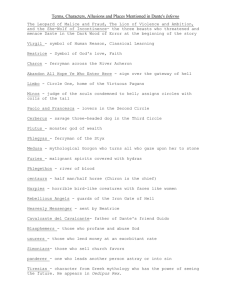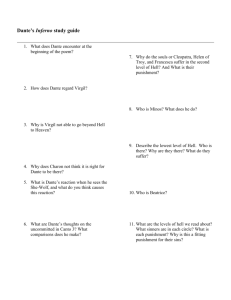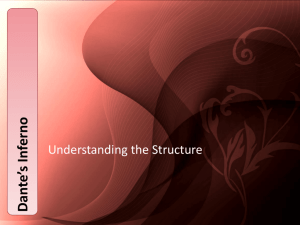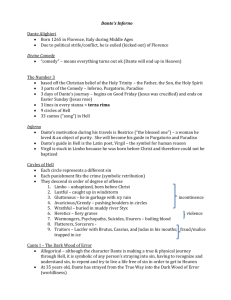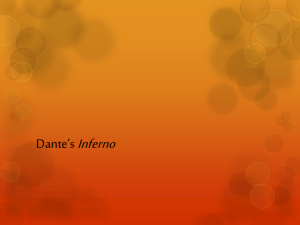11a::L ~L ~~.~A- 499)
advertisement
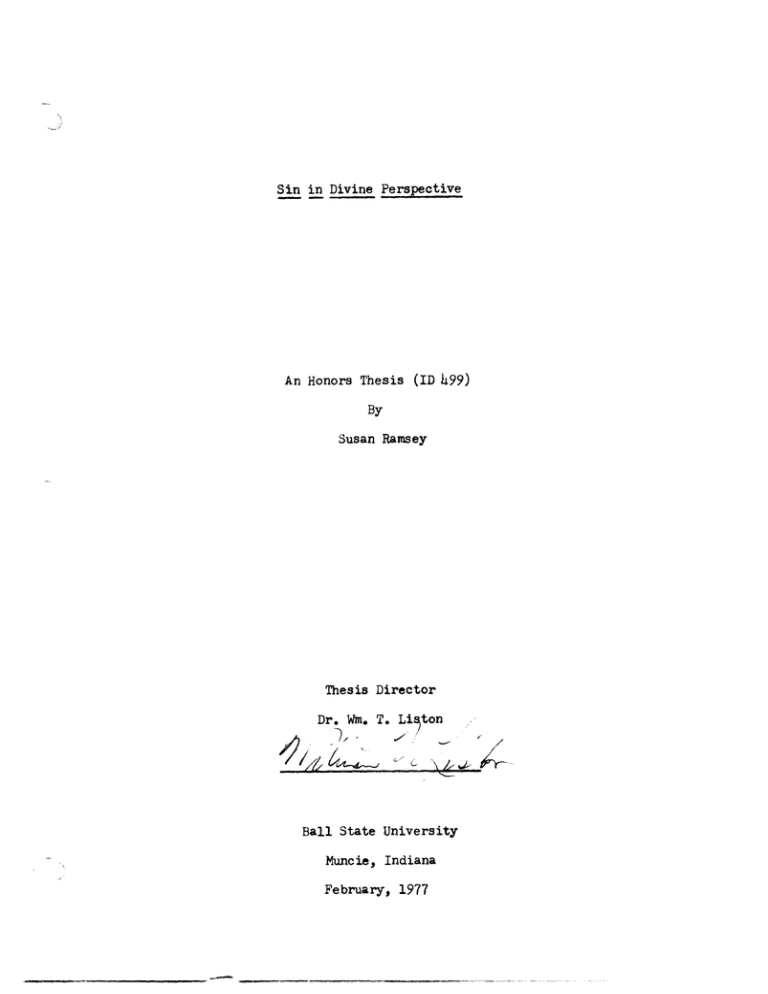
Sin
~
Divine Perspective
An Honors Thesis (ID 499)
By
Susan Ramsey
Thesis Director
Dr. WID. T. Li,ton
11a::L ~L ~~.~ABall State University
Munc ie, Indiana
February, 1977
._----------------_._------
<::.(Il
..-;,.<..
-111«"':
;
.~;
~~'
,
,; r:. £.)
. t! Jf
1 ,,! {'~"/
SIN IN DIVINE PERSPECTIVE
Dante's Divine Comedy is essentially a document of
rooral order.
As a vehicle for
presentin~
this
~oral
order Dante
uses, in John Ciardi's words, " .•• nothin~ less than the total
(1)
universe."
vehicle.
A lesser artist
than Dante could not use this
He would become lost in its immensitv.
Dante oefT1on-
strates his greatness in hi s choice of subject matt'2r, bllt at
the san'e time he pJac€'s a great burden of' comprehension unon his
readers.
If we becotT'e lost in the immensity of his universe he
wi J 1 pot stoop to retri eve
lJS.
Before he
through Paradise he immodest 1 y warns
be~in s
his journe y
1'S:
o
you who in your wish to hear these things
have followed thus far in your little slr.iff
the wake of my great ship that sails and sings,
turn back and make your way to your own coast.
Do not coromit yourself to the main deep,
for, losing me, all may perhaps be lost.
(Par. II. 1-(;)
We can come to understand Dante's universe on manv dif-
ferent levels.
If we examine Dante's view of the nature of sin
we will discover a great deal about his universal scheme and hierarchv of val1les.
1
Dante Alighieri, The Purgatorio, t-rans. and "How to Read Dante l l
b? ,Tohn riardi (New York, 1970), P. 347. All quotati.ons from the
text of the Comedy will be taken from the Ciardi translation unless another rendering is more illustrative of the Dnint I am
making. Any translation oth~r than riarrli's will b~ appropriate Iv
identified.
.
We may be i'lclined to think of sin pri.!]Iarilv in connection with the Inferno.
In truth, we learn very little about sin
anr:! sinners in the Inferno alone.
co~plete
Our understanding of sin lS
only after we have !]lade the entire
iourney through all
three realms with Dante, the Doet and pilgri!JI.
It is necessary to the coherence and sensibility of the
Co~edy
to assume thar the same divine principles apply to every
level of the universe.
In other words,
sin must have the sa!]le
!]leaning in the Inferno
as it does in the PlJrgatorio and Paradiso.
The sou Is in PurgAtory must be undergoing- purgation of essential] y
the same sins as those in Hel] are being ounished for,
in Paradise have heen purifier'! of.
and those
v;e finn evic1ence to s'Jpoort
the se assumpd ons in the story of Count Guido da 1-1ontE'fe Itro
(Inf. XXVII.).
Guido is well on his way to Purp:atorv with St.
Francis 'un ti 1 the h lAck anr;r:> 1 s in tervene and carry him to HE'11
because of his failure to repent.
he "
He tells us very simoly that
who does not repent cannot be absolved" (XXVII. 114.).
It sep~s to bE' of little imnorrancE' in Dantean theology how sinridden one's life is in
or Hell.
detprminin~
The on]v apparent,
whether one goes to Purgatory
and rea' difference between the souls
of the damned and the souls of the saverl in pnrgatorv is that
those in Purgatory rEpented Rt ~o~e ti~r:> before death.
a startling?.y sjmrle idea.
This is
It is even a little annoying 1A7hen vle
think of uir~il ail0 b.is etern.11 confinel;'ent- to I.i~bo.
Let us examine the schemes of the three realms, contrast
- 2 -
and compare them, and consider the meaning and results of sin
in them.
In so doing Wp can understand and appreciate Dante's
moral structure and come to understand why a simpl1e gesture of
faith and repentance is enough to save a sin-filled soul from
damnation.
Of the three rpalms of Dante's universe
of Hell and Paradise as being maximally se9arated.
~V'e
may think
This is true
if we are thinking spatially or of the states of the souls which
inhabit these realms.
Ciardi says, " For Dante .... there was
no real distinction betwepn moral and physical law" (Purgatorio,
"How to <{ead Dant p ,
to
distin~uish
lip.
347.), and so then'
the spatial
separates these realros.
distanc~
act~ua
lly is no need
from the moral one which
Obviously the souls in Purgatory are
nearpr to Paradise in spacp and condition than are the souls in
Hell, hut if we are
thinkin~
p't"oxirrd ties are rearranged.
structurally we notice that the
'Pur-;:satorv is set aDart from He 11
and Paradise because of its transitional nature.
tional in three ways.
It is transi-
The souls in Purgatory move from one cor-
nice to another according to their need for purgation; their
stay on the mount is temporary.
temporary.
The mount of Purgatory is itself
It will cease to exist after the Last Judgment.
Both
Paradise and Hell, on the other hand, are permanent in all respects.
The inhabitants of both are permanently fixed in time
and position.
Hell and Paradise are structurally similar because
thev have the same underlying ideolol,y.
- 3 -
In Paradise we learn
from Piccardc that though the souls may possess different degrees
of blessedness, they all experience as much bliss as they are
capable of enjoying.
Dante listens to Piccarda and then explains:
Then it was clear to me, that everywhere
in Heaven is Paradise, though the Perfect Grace
does not rain down alike on all souls there.
(Par. III. 88-90.)
Beatrice explains further:
All add their beauty to the Highest Wheel,
share the sweet life, and vary in it only
bv how much of the Eternal Breath thev feel.
(Par. IV. 34-3n.)
There are absolute differences in their states of blessedness in that some have a greater capacity for blessing than
others, but these absolute differences are not experienced as
re lati ve fu 1 fi Ilments by the SOllls of th e blessed.
Beatrice's
explana~ion
implies that the absolute dif-
ference in blessing is determined by the soul, not God.
God does
not withhold or bestow his blessing variously, but it is var]ously
ahso~bed
by the blessed.
Note what Piccarda says about the blessed state:
we desire, we have" (III. 71.).
about the state of the damned:
yearn for what they fear
II
I~at
Now consider what Virgil says
"Their dread turns wish:
(Inf.
111.123.).
they
John Ciardi com-
ments on virgil's descriDtion of the state of the damnerl, saying
"Hell is what the darned have Actively and insistpntly wished forti
(Purg., "How to read Dante." p. 34n.).
- 4 -
Hell's scheme is similar
to the scheme of Para~ise in that its inhabitants eternally
live the lives they have wished for, but, of course, the blessed
experience bliss in their blessedness and the damned experience
fear and dread in their damnation.
The damned are also categorized according; to degrees
of damnation.
As there are absolute differences in degrees of
blessedness in Paradise, there are absolute differ€'nces in degrees of damnation in Hell.
Some of the damned are farther from
Thou~h
it isn't so clearly and dE,l iberately
announced in the Inferno
I believe we should understand that
God than others.
the souls of Hell, though more or less damned, do not experience
more or less suffering.
Most reasonable people, I think, would obviously prefer
the castle of Limbo to the burning sand and fiery rain of the
circle of the Violent, or the hornets and maggots of the vestibule of the Opportunists, but this is a very objective and meaningless preference, and the nature of the punishment of sin is
highly subjective.
We know Minos does not distribute his new
arrivals arbitrarily; therefore we may not evaluate their plights
arbitrarily.
All souls find themselves suffering the punishment
which has most meaning for them.
I believe that Virgil, who has
seen the Earthly Paradise, is as tormented as Satan, who has
dwelled with God.
As the souls of the blessed in Paradise have
an increasing appetite, or aptitude for bliss as we come nearer
to God, the souls of the damned have an increasing hardening of
-
5 -
the heart as we descend further from God in Hell.
Dante's God is a very accommodating one.
the Comedy
Throughout
we see God giving all souls exactly what they wish
for, but Hell is certainly no paradise suited to the tastes of
those who reject God.
Men may reject God whi.le thpy live, but
they cannot escape God's judgment when they die.
This is a
truth that all souls realize, after death if they failed to realize it in life.
is supreme,
fering.
fai~h
They realize the truths that God exists, God
brings reward, and sin is evil and brings suf-
The only differ"ence between unrepentant sinners before
death and after is Godrs revelation.
The souls of the dead see
themselves as God sees them, and this enlightenment 1S what
makes the punishments of the damned painful.
Can one argue that it is the highly symbolic twists
the punishments take that make them painful rather than pleasurable?
Fot' example, do the Gluttons suffer in HelJ because they
now lie wallowing in what Dante calls "stinking dirt that festered"
(VI. 26.), and "putrid slush" (1.12) rather than glutting themselves with food and drink as they did in life?
this argument is valid.
I don't think
In God's view there is no difference in
the Gluttof"lOUs life and the Infernal punishment.
If we insist
upon declaring that there is a difference then we admit to rejecting God's revelation of the nature of sinful action and we had
better bring our little skiffs ashore.
Even Bertran de Born, only
ttAlO levels removed fr:Jm Satan recognizes the equivalence of his
sinful life and his terrible punishment.
- 6 -
As he carries his head
in hi.s hand, his punishment for sowing discord, he says, "Thus
is my measure measured to me again." 2
Can one argue that the
nunishment is painful because the sinful act is turned upon the
souls of the damned making them
think not.
~-mt11d
of their own sin?
I
'T'hey were slaves to their sins while living, anJ vic-
timized themselves by
One
victi~s
denyin~
faith and its inevitable reward.
be foolha!'dy to suggest that their sins bring real re-
wards in life and suffering only after death.
A sinner can only
appear to gain from sin, but in reality he always loses.
grimly comments on the false victory of sinners in the
the Sodomites.
Dante
~ound
of
As he watches Brunetto Latino go off to join his
fellow sinners in their perpettlal and purposeless run he says,
••• he seerr,ed,
across that nlain, like one of those who run
for the green cloth at Verona; and of those,
more 1 ike the one who wins, than those who los,e.
(XV. 119-122.).
A sinner loses eternal life in Paradise for his sins, and this he
brin~s
upon himself.
Bein~
the victim of his sins is not a new
state of affairs when the soul.
arrloves l°n
. Hel]-.
Ar
th e dOf
(~a IOn ,
1-
ference is recognition of Divine Truth.
.........
2
Inf.
...
XXVIII. 142, trans. Dnrothy L. Sa~Ters (Baltimore, 1949).
- 7 -
We can, and are likely to place too much emphasis on
analyzing the specific punishments of the damned in our attempt
to evaluate the relative intensities of their suffering.
We must
primarily recognize that all of the inhabitants of Hell are there
because they rejected God.
Thev are eternally puni.shed for their
specific sins, but punishment of sins is not the greatest manifestation of Di.vine Justice in Hel].
The most important fact of
Hell is that all its inhabitants have lost God.
If we lose per-
spective and place too much importance on their specific punishments we are making a foolish
~istake.
As we emerge from Hell,
ascend the Mount of Purgatory and soar through Paradise we should
understand unquestionably that the Grace of God is of supreme
i~­
portance throughout the universe, and losing this grace is a far
more terrible punishment than any of the specific punishments in
Hell which are of the sinners' own making.
this loss of grace in common.
Thz damned all have
The Virtuous Pagans, and the less
offensive sinners in the upper regions of Hell are sure to suffer
this loss more acutely than the hardened, animal-like sinners of
the lower circles whose punishments might seem more unbearable.
We can recognize a parallelism between the different: sensitivities
of the damned for the loss of God and the different capacities of
the blessed for God's blessing.
The Purgatorio is spoken of in superlatives by many
scholars.
Sayers calls it the tenderest, subtlest, most human and
most beloved.
Cantica.
Ciardi considers it to be Dante's most personal
Barbi finds it to be the sweetest and most serene.
- 8 -
Eliot calls it the most difficult.
For me it is indeed all of
these things, and the most interesting and
instructive~
Purgatory has a scheme, quite different from those of
Hell and Paradise.
Hell is the punishment of sin, Paradise is
the reward for faith, and Purgatory serves to prepare the impure
faithful for their blessed reward.
The souls of Purgatory are the souls of sinners.
Some
of their sins are as detestable as the sins of the damned, perhaps
even more so, but in
blessed.
Pur~atory
we can consider the souls to be
They are blessed because they surrendered their souls
to God and died in faith.
In Purgatory we
actions diminish.
be~in
to see the significance of sinful
God cares for the state of a man's soul, and
as Allan Gilbert comments, "A man is not condemned by God for any
number of evil deeds, but only for a character in which evil
tvholly rules." 3
I think Gilbert's statement represents an excel-
lent analysis of the ultimate difference between grace
am damnation.
It is the nature of Dante's God to forgive even the most despicable sin, but it is against his nature to force faith upon the
living.
One has only to accept God to be saved from damnation,
but he must do it of his own fref> will.
Any act of faith or con-
. ..........
3
Dante's Conception of Justice
(New York, 1965), P. 119.
- 9 -
trition is evidence of a character in which evil does not wholly
rule.
Those who find a mere act of contrition a poor
co~pensa-
tion for a sin-filled lifetime, and difficult to accept as the
sole requirement for salvation may find consolation in two facts:
(1) God cannot be fnoled by false faith.
faith in the vestibu1e of Hell.
He find those of false
They are beyond the gate which
tells them "ABANDON ALL HOPE YE {.ffiO
EN'T'E~
HERE.
It
'T'lle truly con-
trite have more than hope; they have Godts promise of Paradise.
en
The ascent through Purgatory is a very difficul t one, and
as lengthy and painful as is necessary to purify the sinful.
v.7hen a soul arrives in Purgatory it is faced with sufferino; and
pai.n.
This suffering is different from the pain of Hell.
Dif-
ferent souls suffer as much pain as is necessarv to rid them of
their sinful tendencies.
In Purgatory we see diffE'rent souls en-
durin8: d;.fferent quantities of suffering, whereas in Hell we could
not quantitatively distinguish the suffering of the damned.
D2nte was a scholar of and believer in the theology of
St. Thomas Aquinas.
Dorothy Sayers points out that Dante applies
the Tho"Jist concept of sin to his universal sche'11e.
Aquinas says,
"Two th ings mav be cons idered in s i.n; the gu i 1. ty act and the con-
.
ae
sequent sta1.n l t (Summa Theol. I. II
, q . 87, ad 7.).
The sinful
act is central to the scheme of Hell, and the residual stain on
the soul is central to the scheme of
Pur~ation
evil and sinful.
purifies the
SOlll
Pur~atory.
by removing that which is
'The soul is not itself reconstructed and nothins;
- 10 -
is added to it.
good.
The idea here is that the pure soul is innately
virgil's discourse on love, perhaps the single most impor-
tant passage in the Purgatorio,
the soul.
sug~ests
the natural goodness of
He says the soul is created prone to love (XVIII. 19.).
Earlier in his discourse he explains that
••• love alone
is the true seed of every ~2rit in you,
and of all the acts for w~ich you must atone.
(XVII. 103-104.).
Sin is the result of misdirected or untempered love.
Man's intellect and coincidental free will enable him to love cor~ectly
and virtuously, and -to be responsible for his sins.
The
task of Purgatory is to purify the soul's love by correcting the
intellect and uniting the will with God's.
The activities of the souls of Purgatory are remedial,
not vindictively punitive.
rary Hell.
Purgatory must be more than a
These souls have yet to learn virtuous ways.
their souls to the
ri~ht
te~po-
To train
they practice constant surrender to the
virtue opposite their sin.
Of the souls in Purgatory Michele
Barbi says, ITThe spirits no longer live in their sin as a still
present and perturbing passion, but aspire instead with all their
ardor to an entirely different life.
4
The net-J lif,e to which they
.............
4
Mark Musa, ed., Essays on Dante, liThe Divine Comedy,"
(Bloomington, 1904) p. 23.-- 11 -
aspire unites their wills with God's.
Let us begin at the base
of the Mount and see how the activity of each cornice
i~spires
a new life for these sinners, and cleanses their souls of the
stain of sin.
J
shall limit my discussion to the activity of
each cornice, and overloo1z the whi_p and rein of each because they
spea~
so clearly
the~selves.
for
The first
Purgatory proper.
~roup
of souls we encounter is not yet within
Here we find the souls of the
Jate-~enentant
includin~
the 8xcomm1 'nicate, the Indolent, thp Unshriven, and the
Negligel"lt
~ulers.
~atory.
The late-repentant tTlust now wait to enter Pur-
exercising great patience and
steadf~st
faith,
since in
Pur~atory
proper
life they neglected matters of faith.
The
~irRt
level within the gates of
is that of the p .... oud.
The souls of the proud now circle the
mountain doubled over under the weight of enormous slabs of rock.
'l'he weight they bear is the t>leight of their sins, hut the weizht
forces
the~
into a posture of humility.
Contrast this to the
image of Farinata in Hell:
Erl?ct,
he rose above the flame, great chest, great brow;
he seemed to hold all Hell in disrespect.
ex.
Th is is indeed the image of a proud man.
34-36.).
Farinata l>las a proud
man in life, and highly respected and feared; but for all his
pride and rr.agnificence in Hell he is totally impotent.
*
*
............
Farinata is, of course, being punished for heresy, not pride
specifically. I shall consider Farinata's position again in a
different context.
12
On the next cornice we find the Envious.
These souls
all sit together supoorting each other, but unable to see each
other because their eyes are wired shut.
virtue is two-fold here.
The enforcement of
The eyes are wired shut so that no soul
can look enviously upon another, but Dante has arranged this level
so that no sOlll has anything; enviable.
He likens them to be8:;!,.:lrs
of h is day, "the iT.poverished blind who s it a 11 in a row'
Indulgences to
be~
their bread
t!
(XIII. 61-62.).
.I during
The arrange-
T.ent of this cornice splendidly exemplifies the cooperative nature of Pt1 rg:a tory.
r:ach sou 1 on the corn ice of the Snvioll s is
instrumental in the healing of each other soul.
Eac'b gi.ves
S1}P-
'['ort to another, and each is hiIT'self llnenv i _able.
We have seen how each of the preceding levers activity
has enforced virtue, but
th~'
cornic(' of t-hE' T,Irathf'ul
some and not as readily understood.
i~
t,..()t1h~.e-
Here we find the souls of
the Wrathful engulfed in a thick and acrid smo'k-e, more obnoxious
than any encountered in 4ell.
Dorothy Sayers says that wrath
blinds the jud,O;T.ent and suff0"ates reason :::mn that "the
of the l.1rathful is therefore
self" (PurEf. XVI.
tion.
Ima~es.
. . . the
p. 192.).
p~ncnc('
('ndurance of the sin it-
'T'his is a
co~mon
interpreta-
John Ciardi'. says, "/\s Wrath obscures the true 1 ight of God,
so thp sro1(.p pl ung0s all
p. 170.).
~an
sin of Wrath?
the
s~oke
j
nto dar'(.ness "
(~urg.
XVI. Summary.
on this cornice be an allegory for the
If so, then as Gilbert points out, we Tust aSSUTC
that here in Purgatory Dante has represented another Hell. (Dante's
- 13 -
concepti on.. of .Justice.
wallowing in and being
p. 121).).
torment~d
In Hell
~'1e
have seen souls
by their sins,
~]t
we have es-
tablished that this is not the nature of Pl1rgatorial penance.
Dante says very little ahout the smoke of this cornice.
He says
nothing in particular to support the view that it is an allegorical representation of the sin of wrath.
t-fuat he does sav
stresses the irritating quality of the smoke.
The irritation of
the smoke could be expected to have the effect of inciting wrath.
An agitating elet'rent is present- in other areas of Purgatory.
Of
the levels we have discussed so far we have seen the great lengths
of tiroe the Late-repentant and Negligent mlJst endure in patient
faith, and the great weir;hts the Proud
~ust
succumb to when their
sinful tendency is to shirk the humility the weight enforces.
(There is no agitating factor in the cornice of the Envious.
This is because one great lesson of this cornice is that in Divine Reality there is nothing of another's worth envying, and
any agitating factor would undermine this lesson.)
spent in Ante-Purgatory
The time
serves to strengthen patience in the
Negligent, the weights of the Proud reinforce humility, and the
smoke of the cornice of the \'Jrathful enforces the virtues ooposite wrath:
caution and meekness.
No1::r the great caution ~-J'i th
which the pilgrim and his guide proceed.
i)ante tells us:
My wise and faithful Guide:> drew near me, •••
and let me grasp his shoulder with my hand.
Just as a blindman - lest he lose his road
or tumble headlong and be hurt or lei lIed walks at his guide's back when he goes abroad;
14
so moved I through that foul and acrid air,
led by my sweet Friend's voice, which kept repeating:
"Take care. Do not let go (If me. Take care."
( XVI. 8-15.)
Ciardi makes an excellent observation about virgil's warning.
Throughout the Comedy Virgil is renresentative of reason and
Ciardi says, "Thus Virgil is wa't'ning Dante, allegorically, not to
lose his Guiding
(1.. 15 n.).
~eason
in the blind immoderation of wrath
The repentant \,vrathful soul, Harco Lombardi, guides
Virgi 1 and Dante to the Angel of Meekness. but turns back h -LfT'.se 1 f ,
saving "It is not fit he sel? me" (XVI. 145.).
He moves back into
the smoke meekly to endure its irritation.
The next encounter we have is with the Slothful.
Their
almost comic zeal needs no comment.
We find the Hoarders and the Wasters on the next level.
They are bound facing the dust.
as an allegory of the sin:
Again,
Say~rs
sees this penance
lIThe souls are so fettered that they
can see nothing but the earth on which they once set store"
(Furg.
XIX. Images. p. 221.); and again Gilbert's countertheory
i.s impelling: "Thp question arises: Are earthly things and the
earth substantially identical?
stead a contrast in
~eaning?
Or can we feel that there is inEarthly things are the good things
of this earth which the eyes of those who are now grovelin<:: in
the dust no lone;er look upon" (pante's Conception of Justice.
p. 132.).
at'lrj
These souls we't'e obsessed by eaTthly ric':1es ",hile Jivinr,
no", '::hey \[lust COTltp"'n 1 :1tr:> thp hlnnb 1 e dust.
- 15 -
Si ncp hoardin rr and
wastin~ ~eep a soul earthhound
and
correcti~re
Tor
it might
se~m ~ore appropriate
these souls to look tmvard
heavE~n,
but purga-
tion must bring earthly thin.rf,s into DT'Oper perspective fo!" all
s i.nners, and the Hoarders and \.-!asters must recogn i.ze the humbleness of the earth.
Th(l s01Jls of the muttons whom
fully emaciated.
~ve
see next appear pain-
Their determin(>d abstinence in tbe presence of
great temptation is clearly corrective.
The next, and last cornice of sinners is that of the
Lustful.
Lust is the least offensive of the Seven Deadly Sins.
Dorothy Sayers calls it "the noblest of earthly lOVE'S" (Purg.
XXV. Images. p. 2h7.).
These souls gre punished by being en-
wrapped in a wall of' flame.
The use of fire is a common ':nethod
of purification, but Dante t s use of fire as a
mE~ans
of purging
the sin of lust is particularly interesting, and his most ingenious way of
demonstratin~
his tolerance of this sin.
Sayers says
"Fire, which is an image of Lust, is also an ima5!,e of Purity.
~he
burning of the sin, and the hurning charity which is its op-
posing virtue, here coalesce into a single image and a single experience"
(Pur~.
xxv.
Images. p. 267.).
The Fir€' of Purgatory
is a purifying one, and one which exceeds the heat of Lust.
This
fire is not peculiarly the penance of the Lustful and so it C8Pnot be equated with the fire of Lust, but here at the top of th""
Mount Dante shows this sin merging with its opposinq; virtue rather
than being replaced by it.
We might also note that Dante does
16
not use fire as an allegory for Lust in Hell.
He uses fire in
connection with I,us t only in Purgatory t.,here the sou] shave
saved
the~selves
from damnation.
Only the Lust of the rependant
is akin to Pure Love.
The Angel of Chastity tells the three
pOE~ts7
Dante,
virgil and Statius,
no soul
••• til
may pass this point.
by blame purified
(XXVII. 10-11)
Ciardi suggests that this could mean that no soul is entirely
free of Lust, but is more convinced that the best explanation is
that "Since no mants soul
is perfect in its love ••• it must en-
dure the fire that purifies impure love" (XXVII. 11. 10-12n.).
After passing through the wall of fire a soul is pure and ready
to enter
th~
Earthly Paradise where it will lose all memory of
evil by being immersed in the waters of Lethe, and strengthen the
memory of goodness by
drinkin~
the waters of Eunoe.
In the Earthly Paradise we have seen the last of sin.
We can learn no more about sin directly in Paradise because of
its absolute and necessary absence, but let us go back and consider
the idea of sin in HE'11 and Purgatory in another way.
In
accordan~e
with the Thomist theory of the dual nature
of sin, the act and the residual staj_n on the soul, we have seen
that the sinful act is central to the scheme of Hell and the stain
is central to the scheme of Purgatory.
- 17 -
"'7e understand how and why
the activities of the inhabitants of Purgatory tend to their
damaged and sin-weakened souls, but why is only the sinful act
treated 1n Hell?
To be sure, God damns his unrepentant sinners
because of their cor!'upt and lmhealthy souls, bpt the 'unrepentant
must be punished in [\ way that they will understand.
Dante ex-
plains God's neglect of the basic corruption of the souls in Hell
"
h " ' V"1r~1"1
1n
one l '1ne W.lcn
1
spea~s.
Virgil describes the damned as
"souls ~qho have lost the good of intellect Tf (Inf. TTl. 18.).
The intellect is that part of a man which enables him to aspire
to the Divine, and in denying ('-rOd the soul destroys its own intellect.
Any punishment which is directed toward the basic in-
tellectuaJ corruntion of the damned
~v0uld
be lost
0n
the':'"' because
they have no intellect with which to perceive this kind of Divine
Justice.
Some interesting consequences result from the abRence
of the intellectual element of sin in Hell and the absence of concern for sinfu] actio!"18 in Pl,rgCltory.
"{:Ie
ackno\'Jleclge thot: the
actual sins of those undergoing purgation a!'e essentially the
sa~e
as the sins of the damned, yet i f we attemnt to nla: 7
speclJ lative ga'O:es in wh ich
~ve
so~e
wou Id ass ign P1Jrgatorial pos i tions
to souls in Hell had they repented, or Infernal positions to souls
In Purgotory had they not repented,
haps we can assign
r~ciprQcal
souls in each for the
~ins
~ve
rare 1 y find success.
positions in the
op~nsing
Per-
realms to
of Lust, Gluttony, Avari.ce and Prodiga-
- 18 -
lity, and Hrath. *
He 11
cl)nt~lins
these ca tegor ies \-lh ich correspond
to identically n3Ted categories in Purgatory, but here the correspondence ends.
There is the weak explanation for the correspondence of
these areas only which claims that Dante began the Inferno i!1tencin~
to trent sin in Hell accordins to t:,e standard Seven Deadl:;'
Sins and then abandoned the
~roject
aft~r
00mplptiD~
seven Cantos.
In response to a friend's persua8ion he continued his allegorical
journey years later hut took a different direction which departed
from his original intentions and th1JS the correspondence was destroyed.
It seems rather careless, chaotic and
as careful and orderlv as
~ante
to
chan~e
unli~ely
for a poet
directions in mid-stream
if the change didn't fit the scheme of his univers<:l order.
The
evidence to support the theory that there was a lengthy interruption between C.:antos ·VI} and VIII of the Inferno is convincing,
but we need not conclude that the resumption sets off in a direction other than Dante's original intention.
Of the Seven Deadly
Sins, the four we find specifically punished in Hell - T...ust,
Gluttony, Avarice (and Prodigality) and Wrath - lead to specific
and narrowly defined sinful actions.
This is why the sinful acts
resulting from these sins can be identified and punished in Hell.
...........
*
We cannot feel very secure in ma~ing these assignments. In
light of the fact that Dante places the Sodomites with the l~st­
ful in Purgatory and with the violent Against Nature in Hell, we
can conclude that Dante himself didn't intend significant correspondence.
19 -
The correspondence exists but the treat~ent remains different.
Francesca' s lon~ and detailed story provides us ~vith a ilistinct
image of lustfulness.
activity.
In Purgatory there is no sense of lustful
We find a vivid and disgusting ima~e of gluttony in
Hell, but there is no sense of this sin in the corresponding area
of Purgatory.
The S1..ns of v.Jrath and Avarice pervade tl)eir respec-
tive areas of Hell, but are absent in Purgatory.
The remaining three of the Seven Deadly Sins - Pr.ide,
Envy and Sloth - lead to a
because of rheir
~ore
~uch
broader range of sinful actions
abstract nature.
,.!hen we go deeper into Hell we are stumped in our soeculative games.
What Purgatorial positi0n shall 'it7e assign to the
Heretics in He] 1 if tve imagine they had repented?
Or the violent?
Dante devotes five Cantos to sins of violence in Hell, but therE'
is no area in
Pur~atory
where violence is specifically trE'atcd.
The remaining areas of Hell are devoted to punishing various forms
of fralldulent behavior.
There is no mention of fraud in
Pur~atory.
There are no areas in Purgatory which correspond to the Infernal
areas of Heresv, Violence and Fraud because these sins are secondary to deeper and more basic intellectual corruption.
Ve can
half win our game by assuming that the Heretics, the Violent and
the Fraudulent would spend much
the Envious,
ti~e
on th0 cornices of the Proud,
the Slothfu 1, and probab Iv the ,\,Jrathf,1I , had the y
20
repented.
These are the sins of which they are all ultimately
O"uilty
but we absolutely cannor- determine what Infernal sins
to>
,
the souls in Purgatory would be punished for had they not repented.
This is crucial - there are no details given describing
the sinful actions of the S0111s in Purgatory and we cannct transnlant
the~
into Hell because our map of Hell is drawn only accor-
ding to actions.
We were able to make a comparison between Farinata in
Hell and the Proud in
Pur~atory.
It is not surprising that we
can perform imaginary redemptions, limited though they may be,
and not imaginary damnations.
It is naturally easier to fit the
specifics of Hell into the abstracts of Purgatory.
It is impos-
sible to do the reverse.
We see that this lack of
interchan~eability,
or equlva-
lence, between areas of Hell and Purgatory is not something we
can pass off as a meaningless quirk.
sary consequence of the
~oral
It is a natural and
nece~-
and theological foundation upon
which Dante buiJds his Universe.
Dorothy Sayers has given consideration to this noncorrespondence between areas of
Pur~atory
and Hell.
She says,
Dante "is the most symmetrical of poets; but the symmetry of art
is like that of nature, and is
but by a
p. 14.).
co~respondence
pro~uced,
not by a dead uniformity,
and baJance of parts" (Purg. Introduction.
These tvTO real!'1s are, in fact, superbJy balanced, but
not in such an obvious way that we can readily second-guess Dante.
21
i,That is our overall i~age of Hell?
1>7ithin a deceDtively
orderly framework we see chaos, clutter, crowdinrs, and futility.
There are twenty-eight senerate areas where sinners are punished
in Hell, all isolated and inescapable.
"'That is our overall
order,
har~nony,
i~age
of P1Jrgatory?
'Ve find thorough
spaciousness and a sense of unified upward surging.
At most there are eleven areas of Purgatory.
There are only eight
if we ~onsider the four classes of negligent to be one distinct
group.
IN'h3't ;s the ultimate "::leaning of our topographical ratio
and contrastine images?
us.
Thomas Bergin answers this questions for
He says, "There is but one way to salvation and there are
~any avenues to error~1 (ES~ on Dante.
Derrography," p. 78.).
Dante's.
T, esnecialJy lik.e this thou~ht of B2rgin's
~ind
because it reveals a
n~I~ 11: TOT)ograrhv and
that so very well understands and
There is but one way to salvation.
surrender of the soul
~i~ics
It is the willing
to God, a declaration of faith.
Bergin
says there are many avenues to error; he does not say there are
many avenues to damnation.
There is only one tolay to damnation,
and that is rejection of God, but there are many ways that men
can turn from God.
Ber~in's
thought contains the same artistic
symmetry which characterizes the entire Comedy.
He has set up a
parallel, but only to emphasize the immense disparity between salvation and damnation.
22
We cannot correctly liken anything in Hell to anything in either of the reaJms of Grace
thing that is apart from God.
ima~e
Hell is every-
Hell was devised by God to sepa-
rate and remove the evil from the pure.
exciting and fascinating
becaus~
Dante has created an
of the damned and their realm,
but we must not be deceived and dazzled by its spectacular nature.
The message of the gat-e is clear - "I AM THE 1.JAY TO A F01{SAKEN
PEOPlE ~" and as God has forsaken them, so must
23
~]e.
BIBLIOGRAPHY
Alighieri, Dante. [The Divine Comedy]. Trans. John Ciardi. New York:
New American Library. The Inferno, 1954; ~ Purgatorio, 1961;
~~ Paradiso, 1970.
---
iOi%.
• The Divine
Trans. Dorothy L. Sayers. Baltimore:
--'""'lpl'!"e-n-gu-in Books. Hel,
9; Purgatory, 1955; f.,aradise> (with
Barbara Reynolds~962.
Bergin, Thomas G.
Eliot, T. S.
~~.
Gilbert, Allan H.
Inc., 1965.
Musa,
Mar~,
Dant..
ed.
Boston: Houghton Mifflin company, 1965.
London: Faber and Faber, 1929.
Dante's Conceetion of Justice.
Essays
~~.
New Y'ork: AI'S Press
Bloomington: Indiana University Press,
1964.
Toynbee, Paget. Dante Alighieri - His Life and Works. Ed. Charles S.
Singleton. NeWYork: Harper ana ~(Harper Torchbooks), 1965.
